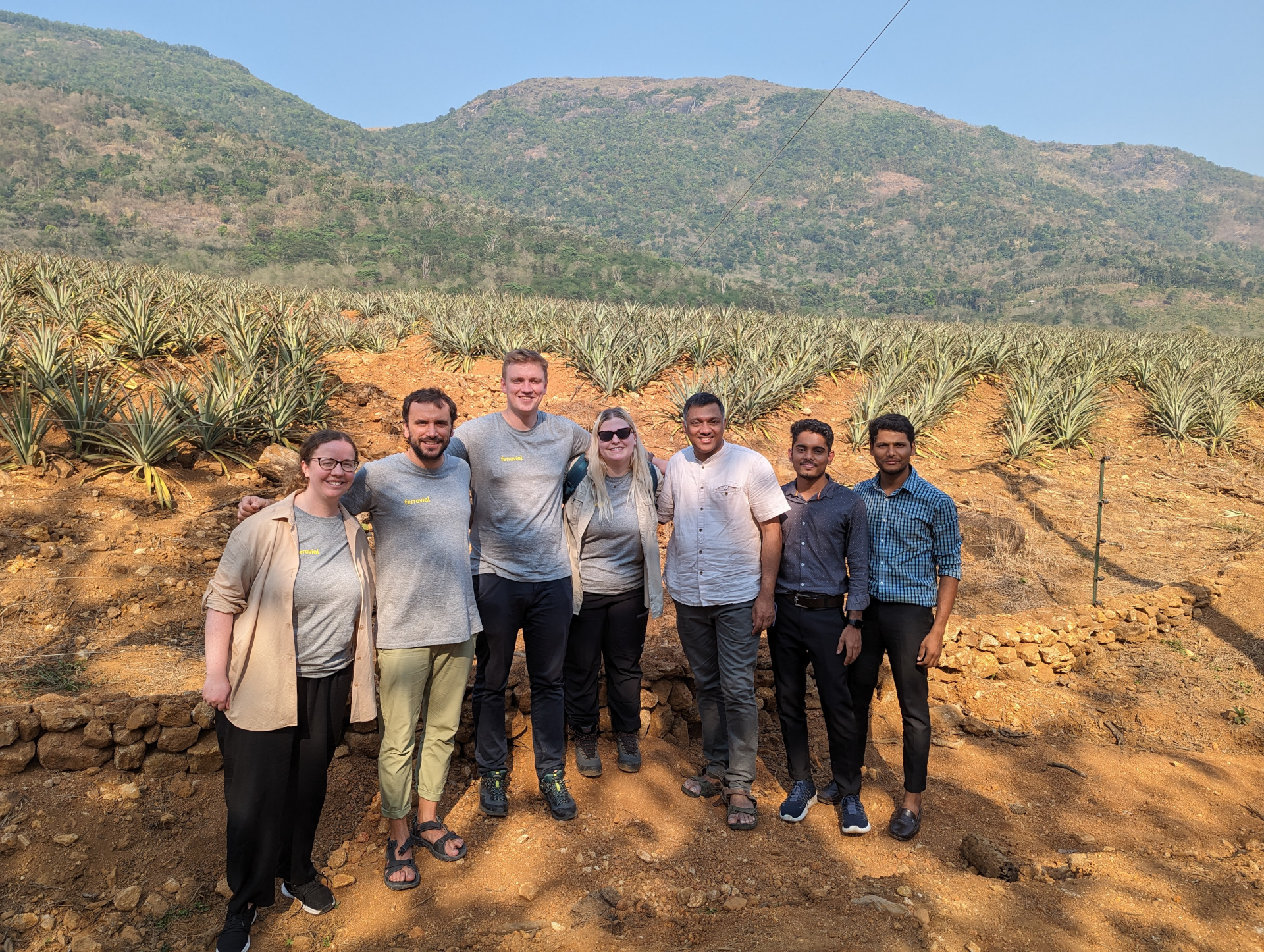
Powerful Life Lessons From Volunteering In India
05 of December of 2023
Ferrovial is working with the Esperanza y Alegría foundation to build a sustainable rainwater harvesting system to ensure year-round access to clean water at the Mundakayam Medical Trust Hospital in Idukki in Kerala, India.
I was fortunate enough to be selected alongside three other international volunteers from Ferrovial to spend two weeks in India to help with this project.
All of the volunteers except for me had engineering profiles. They acted as consultants, sharing their technical expertise and advice on how to improve the hospital’s existing water systems and how to build new infrastructure for safe water collection, storage, treatment, and distribution.
In my capacity as Social Media Manager, I was in charge of capturing and sharing the essence of the project by taking photos, interviewing the people working at the hospital, and filming testimonial videos of the other volunteers.
My ultimate goal was twofold: to generate awareness about the clean water project, and to encourage Ferrovial employees to volunteer for more social infrastructure projects in the future.
But the experience was so much more than I ever imagined, introducing me to lifelong friends and a philosophy of life that I will never forget. To fully understand Indian culture in all its complexity, I’d have to live 10 lifetimes just to scratch the surface.
A life-saving project
Millions of people in India lack access to clean water.
In a hospital setting, safe water is especially essential so that medical staff can wash their hands, clean patients’ wounds, prevent infections, and avoid the spread of waterborne diseases.
The idea of the clean water project at Mundakayam Medical Trust Hospital (MMT) is to set up an infrastructure that captures rainwater during the monsoon season, filters and purifies it, and stores it so that clean water is available throughout the year, even in dry seasons.
This hospital plays a critical role in the Idukki district of Kerala because it provides healthcare for everyone, regardless of their ability to pay for treatment. There are extremely impoverished people living in the surrounding areas who cannot afford to go to other hospitals. It’s also located near many people who desperately need treatment and would have to walk three hours to reach another medical center.
Furthermore, the hospital, which is run by the local Catholic diocese of Kanjirappall, works to benefit the community in many ways beyond treating patients with medical needs. For example, it has a nursing school program and they have some sponsored places to allow students from all different backgrounds to get an education they wouldn’t otherwise be able to afford.
Education is key to breaking the cycle of poverty. Rather than not having a job at all, as is often the case for many women and people from lower castes, these nursing students are able to gain knowledge, pursue a career, and have their own independence. They can then pass that empowerment on to their children in the future, which will have a major impact on the community in the years to come.
The pivotal role of communication
When I first arrived in India, I was quite conscious of the fact that I was the only non-engineer volunteer. During meetings, we were introduced to everyone as engineers, and in these moments, I felt a bit out of place and slightly worried that somebody would ask me something technical.
Thankfully, I quickly saw the value I brought to the project, not just because of my professional expertise in digital communication, but also because of my ability to connect English and Spanish speakers in real time.
We had a remarkably diverse group of people working together, from Esperanza y Alegría, the Spanish foundation we went with, to the international volunteers from Ferrovial, to the Indian engineers, consultants, and hospital staff.
Although everyone spoke English, some people felt more comfortable speaking in Spanish. Since I am fluent in both, I would jump in as needed to make sure everyone was on the same page, while giving people the freedom to express themselves naturally and authentically.
Seeing how I strengthened the group dynamic and was able to harness my ability to connect people helped me overcome any doubts I had about being the only non-technical person on the trip.

Embracing the elegance of spirit
I remember sitting down with María Moreno Sorrosal, the president of the Esperanza and Alegría (Hope and Joy) foundation before the flight.
She told me about her experience working in India and meeting people who have absolutely nothing in terms of financial wealth, but have something about them, this elegance of spirit, that is so powerful and so beautiful. And that idea really stayed with me because I experienced the exact same thing.
All the people I met, from Father Soji, the director of the hospital, to the nuns working as nurses there, impressed me in so many ways. They were so kind, so generous, so thoughtful, with their time and their words, even though they had so many things to deal with, given all the stress of working at the hospital.
One example is that when the engineers were doing their consulting to improve the water system, the nurses would come and give us some refreshing watermelon. It may not sound like much, but I think all of us volunteers were amazed and truly touched by these types of gestures.
I will never forget the fact that these people were so kind and so grateful, when you felt like you should be the one thanking them for helping all the people in need through their incredible work at the hospital. It makes you think, if they can be like that, with all they’ve got to manage, we can all learn to be more patient and caring.
And Father Soji, I could talk about him all day.
I first met him on the Zoom call with the other volunteers before the trip, and as soon as he appeared on camera, I thought, this is someone who is very special. He has a smile that lights up his face, he just has a kind, good person energy.
He oversees the hospital, which is a very demanding job for anyone, but again, his patience and kindness and generosity with the amount of time he made for us all was deeply touching.
He seemed to have boundless commitment to the hospital and boundless time and patience for the volunteers. That’s something that struck all of us. We each cultivated a special relationship with him, and we continue to stay in close contact long after the end of our two weeks in India.
A shared experience with other volunteers
Our group of volunteers made a really good team. We are all from different backgrounds, hailing from England, Spain, Poland, and the United States, but that was part of the joy of us coming together in India. We all brought something different to the project.
Of course, there are some things we had in common: being open to all kinds of experiences and being very respectful of everyone we met and of all the different customs we came across.
Many of the experiences were quite surreal, and you just have to be open to it, to go with the flow of it. Each day was an adventure—we didn’t know what was going to happen, or when it would happen. Time flows differently there.
Several of us had planned on keeping a travel diary, but each day was so incredible and so intense that we didn’t even know how to begin to write about it.
It was unlike anything any of us had experienced before, and we were all very grateful for the opportunity to volunteer. Ever since, we’ve felt connected by this unique experience that’s hard to put into words.
A fresh sense of perspective on life, work, and values
One of my biggest takeaways is to be genuinely grateful for what we have, even the most basic things, like clean water. It’s important for all of us to be aware of how privileged we are. Before traveling to India, I rarely stopped to think about the water I use to wash my hands or brush my teeth.
This experience has also made me reflect on what my personal values are. I’ve never met anyone like Father Soji, who is so dedicated to his project. Perhaps it’s partly because he’s a priest, so he sees his work not just as a job, but as a greater mission. Thinking about what drives you must be part of the key to finding happiness in whatever you do.
In any job, when you have many demands, it’s easy to get lost in the stress of it and lose sight of the big picture. When challenges come up on difficult days, you can stay motivated by taking a step back and reconnecting with your purpose, by remembering how what you’re doing benefits others.
For example, in my role, when I’m sharing content about this project, the purpose is to encourage more volunteers to participate, and to help the Esperanza and Alegría foundation and Mundakayam Medical Trust Hospital gain more visibility so they can get more resources and help more people now and in the future.
Lastly, I want to remember that we all can help other people in our lives, and that one small action can make an impact that ripples out beyond a single lifetime.





There are no comments yet